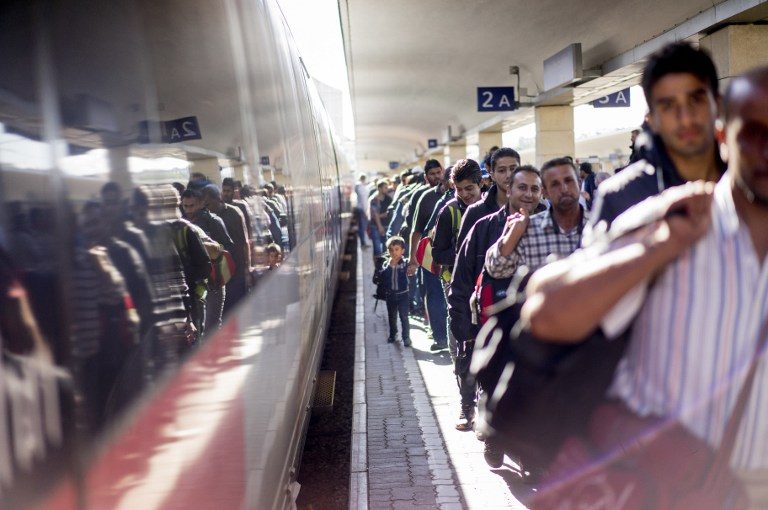SUMMARY
This is AI generated summarization, which may have errors. For context, always refer to the full article.

MUNICH, Germany – Germany on Sunday, September 13, announced that it will reinstate border controls with Austria, as Europe’s top economy struggled to cope with a record influx of refugees.
Tragedy struck again off the coast of Greece, with 34 more migrants – among them babies and children – drowning when their wooden boat capsized in high winds.
Athens, on the frontline of the massive surge of migrants and refugees trying to reach Europe, angrily dismissed criticism of its handling of the crisis and appealed for outside help.
Local authorities in Germany, which has earned praise for its welcoming stance towards refugees, were meanwhile buckling under the sudden surge of arrivals.
Passport checks had been abolished for countries within Europe’s Schengen zone, but the German decision to bring back controls is expected to be announced by Interior Minister Thomas de Maiziere at a press conference on Sunday evening, several media reports said.
Austria’s rail company also said it was suspending trains into Germany.
Some 13,015 refugees arrived in Munich on Saturday, September 12, alone, and at least 1,400 are expected Sunday to reach the southern German city – the end of their exhausting and often perilous journey through Hungary and Austria.
Europe’s biggest economy has become the destination of choice for many refugees, particularly for Syrians after Chancellor Angela Merkel decided to relax asylum rules for citizens of the war-torn country.
“Given the numbers from yesterday, it is very clear that we have reached the upper limit of our capacity,” said a Munich police spokesman.
Federal transport minister Alexander Dobrindt also said “effective measures are necessary now to stop the influx”.
“That includes help for countries from where refugees are fleeing and also includes an effective control of our own borders which also no longer works given the EU’s complete failure to protect its external borders.”
Dobrindt was essentially referring to the border between Turkey and Greece, where many migrants have crossed.
Merkel herself had called Saturday on Athens, which facing its own deep economic crisis, to make more effort to protect the EU’s external borders.
But interim Prime Minister Vassiliki Thanou branded criticism of Greece as “unacceptable”, as another 34 people – among them four babies and 11 young children – perished when their boat capsized off the island of Farmakonisi.
Eight of the victims were found in the hold.
“Greece is strictly applying European and international treaties without ignoring the humanity of the situation,” she said on a visit to Lesbos, an island which has been struggling with the massive influx.
European Union home affairs ministers will hold emergency talks on Monday, while Organisation of Islamic Cooperation was due to discuss the crisis Sunday.
While Jordan, Lebanon and Turkey are housing millions of refugees from Syria, many wealthy Gulf states are facing increasing scrutiny over their apparent reluctance to take in people fleeing the conflict.
The International Organization for Migration said Friday, September 11, that more than 430,000 people have crossed the Mediterranean to Europe this year, with 2,748 dying en route or going missing.
‘Brink of collapse?’
In Munich, order had largely returned to the city’s main railway station on Sunday even though the federal interior ministry said 13,015 people had arrived over the past day.
But Germany’s local authorities say they are at the end of their tether.
The president of the Upper Bavaria region, Christoph Hillenbrand, said he did not know “how we can cope”, according to the Bild am Sonntag tabloid which headline its article “Munich on the brink of collapse”.
Bavarian public television BR said the city “came very close to a humanitarian disaster”, although the authorities finally managed to limit the numbers of people sleeping on mattresses on the floor to just a few dozen, rather than the hundreds as earlier feared.
In a sign that the city was running out of options, regular passenger trains will be cleared out to transport refugees.
The aim is to rapidly send refugees onwards to other German cities to free up space for new arrivals.
The authorities are also mulling over whether to open up the Olympiahalle – a stadium used for the 1972 Olympics and which today serves as a concert hall or sports arena – as a temporary shelter for the refugees.
European divisions
As the continent scrambles to respond to the biggest movement of people since World War II, sharp divisions have emerged among the European Union’s 28 member states.
While Germany and France back proposals to help “frontline” states Italy, Greece and Hungary struggling with the influx, European Commission plans for sharing 160,000 new arrivals in a quota scheme are facing resistance from eastern members.
Czech Prime Minister Bohuslav Sobotka insisted his country would never accept compulsory quotas, saying that the system “won’t work”, while Slovakia said it would also vote against the measure.
Hungary, which reported a new record in migrant arrivals – 4,330 on Saturday – was working around the clock to finish a controversial anti-migrant fence along its border with Serbia.
Budapest has recorded some 180,000 people entering illegally this year and has passed a raft of tough new laws that will take effect on Tuesday, meaning anyone crossing the border illegally can be deported or even jailed.
Hardline Hungarian Prime Minister Viktor Orban had said that the migrants are “not coming our way from war zones but from camps in Syria’s neighbors… So these people are not fleeing danger”.
Describing the “very dismal situation” at Hungarian police camps, Human Rights Watch emergencies director Peter Bouckaert said people are kept in tents with very little food and given almost no information. – Ralf Isermann and Pauline Curtet with Katerina Nikolopoulou, AFP / Rappler.com
Add a comment
How does this make you feel?
There are no comments yet. Add your comment to start the conversation.